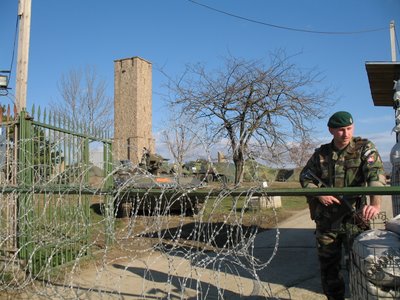 UN sponsored troops guard Serb monuments against possible Albanian terrorism
UN sponsored troops guard Serb monuments against possible Albanian terrorismKosovo Polje means field of blackbirds and that's what we found about a half hour outside Prishtina. Flat, plowed fields and lots of big cawing birds. But this is a historic place -- which is why I forced Svjetlana to sit bored out of her mind for an hour of driving. "You'll tell your grandchildren you were here," I urged her. "No," she said in English that is suddenly much better than I ever heard her speak in Sarajevo, "I won't."
In 1389 the Serbs lost their independence here in a ferocious battle against the Turks. I've read a lot about it and basically historians don't really know for certain anything that happened. It's even in dispute whether the Turks really won. It might have been a draw. No one knows exactly where in all the acres of fields we can still see where the battles were fought. But this is the stuff of legends and epic poems (Don't worry, I'm not quoting any more poetry.)
Prince Lazar of Serbia was killed here, so was his rival, the Sultan Murad I, whose tomb is guarded by Bosniaks, Muslims, centuries later. But the Serbs turned Lazar into a martyr, especially becan on the eve of battle against the Turks who far outnumbered them, he told his men to choose between fighting for the Holy cross and Golden Freedom or surrendering and living as slaves of the Muslims.
They took communion, went into battle and became martyrs. The Turks ruled over Serbia for hundreds of years, but never easily.
Fast forward to 1989 and Slobodan Milosevic flies to this same field in a helicopter and has himself put down into a prearranged crowd of thousands and there he delivers a blistering speech -- conveniently caught on camera and replayed almost as much as the collapse of the Twin Towers -- saying Serbs heroically defended Europe agains the infidels in 1389 and they had to unify and continue to defend today. This was a hostile nationalistic call to unity that swept him into power and the Balkans into war.
Serbs regard Kosovo as its emotional and national heart and origin and that is why they have hung on to the place even though its 90 percent Albanian -- and Muslim. Like minorities that clung to power in Africa the Serbs resorted to threats and repression concludig with the 1999 war. NATO made sure the Serbs did not get control over Kosovo and it's looking like Kosovo will be granted independence soon. Most Serbs have emigrated to Serbia to get out of harm's way. Their Albanian countrymen cheered their leaving.
So visiting the monument to Serb heroism at Gazimestan was not like say visiting Antietam. SFOR Troops are assigned -- apparently at great cost -- to guard all Serb monuments, churches and treasures in Kosovo -- so we rode past a road block and faced more soldiers and vehicles than I could believe. A sniper was in plain view atop the monument. Hawley talked the commander into a photo. Just one, he snapped.




1 comment:
Post a Comment